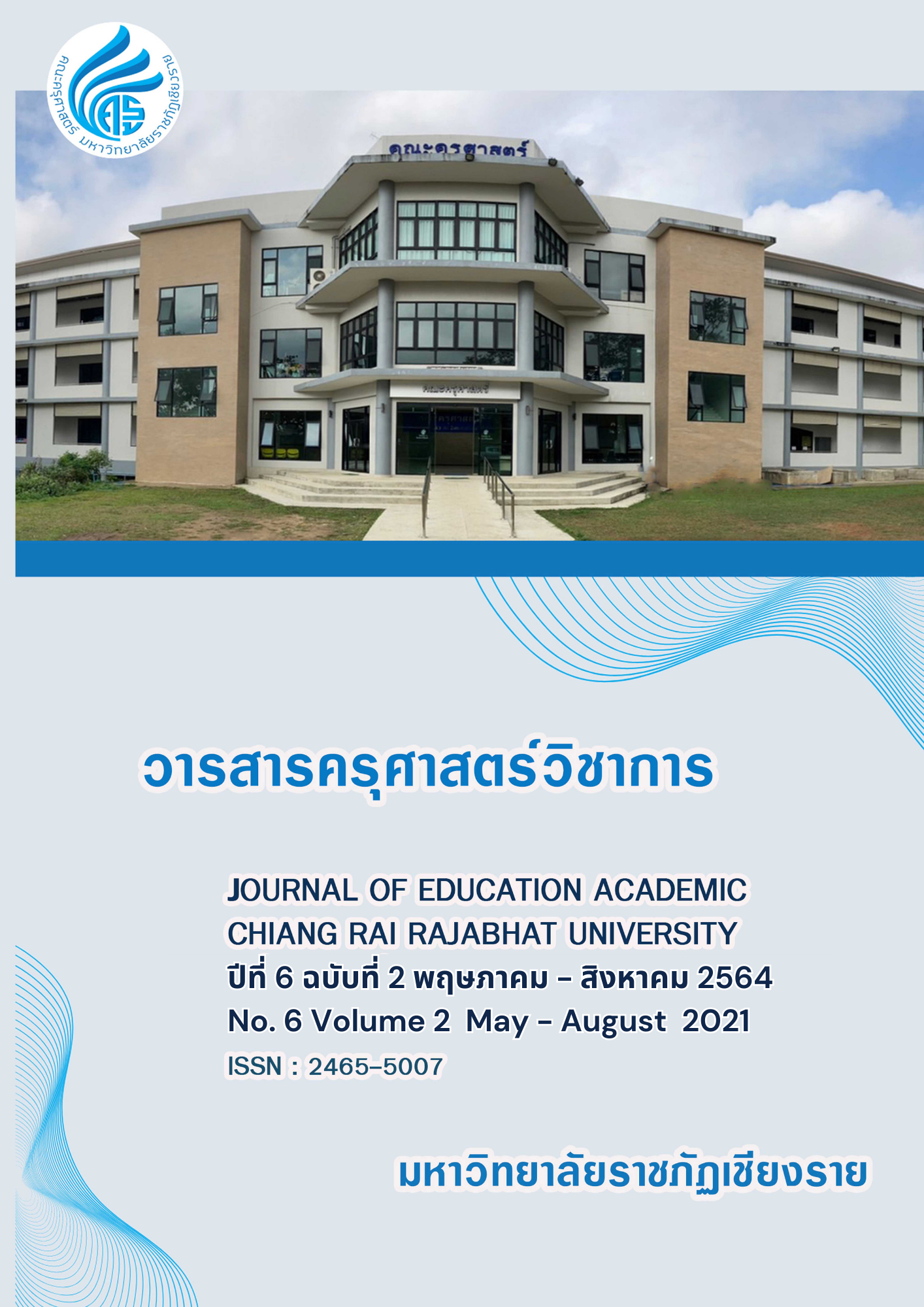The Guidelines for Transformational Leadership Develop of School Administration in Yod Doi Thoed Thai School Network under Chiang Rai Primary Educational Service Area Office 3
Keywords:
Transformational Leadership, School Administration, Yod Doi Thoed Thai GroupAbstract
The aims of this study were: (1) to examine the transformational leadership of school administrators in Yod Doi Thoed Thai School Network; (2) to investigate the factors affecting transformational leadership of school administrators in Yod Doi Thoed Thai School Network; (3) to develop the guidelines empowering transformational leadership of school administrators in Yod Doi Thoed Thai School Network. The data source recruited 90 participants including 4 school administrators, 8 school committee members, 78 teachers and educational personnel. The research instrument questionnaire, interview and focus-group discussion. The data was analyzed for mean, standard deviation, content analysis and developed into a summary report. The results showed that:
- The transformational leadership of school administrators in Yod Doi Theod Thai School Network was rated, in overall, at the moderate level.
- The factors affecting transformational leadership of school administrators in Yod Doi Thoed Thai School Network comprised 2 aspects i.e. Personal Factor involving Leader’s Characteristics, and External Factor involving Organization Environment. The promoting factors were school administrators showing high enthusiasm and determination, self-confidence, friendly to teachers, visionary and positive attitudes in moving forward the school development, accepting opinions from teachers, and acculturating the local culture of the community, attempting to assign tasks to teachers equally, acting precisely in compliance with the school’s regulations, operating activities according to government policy, designing clear organization structure, allowing teachers to express ideas and opinions freely, promoting teamwork for harmony among school personnel. The de-promoting factors revealed that school administrators were still young, emotionally unstable, and lacking systematic working. Some administrators were under assessment by the affiliated organization that affected decision-making competence and ability in carrying out other tasks beyond government policy, lacking persuasive skills, authority constraints, and diversified background of staff hindering team working.
- The guidelines for transformational leadership development of school administrators
in Yod Doi Thoed Thai School Network comprised the following aspects. (1) Building power or influence: Should study idol administrators and review techniques and understand their administration styles. Organize workshops, training and activities promoting knowledge exchange activities. (2) Building motivation: Should study and understand scope of responsibility of the school, act as role model and respectful roles as school administrator. (3) Stimulating cognitive competence: Should study and analyze organization in order to review concepts, theories, philosophy regarding educational administration and management from research or case studies of best practices administrators. - Individual Recognition: Should understand individual differences, strengths and weaknesses among the staff, decentralize the responsibility for each person matching with their competence and personality. Develop communication methods for staff, parents and community. Pay attention to problems of staff, parents and students in order to build understanding and promote cooperation for the school development.
References
พรนพ พุกกะพันธ์. (2544). ภาวะผู้นำและการจูงใจ. กรุงเทพมหานคร: จามจุรีโพรดักท์.
ไพรสุดา หมั่นหาดี. (2556). ความสัมพันธ์ระหว่างภาวะผู้นำการเปลี่ยนแปลงของผู้บริหารสถานศึกษากับประสิทธิผลของโรงเรียนในเครืออักษรกรุ๊ป. (วิทยานิพนธ์ศึกษาศาสตรมหาบัณฑิต). ชลบุรี: มหาวิทยาลัยบูรพา.
สมเกียรติ เภากัน. (2545). ปัจจัยที่ส่งผลต่อความเป็นนักบริหารของผู้บริหารสถานศึกษาสังกัดสำนักงานการประถมศึกษาจังหวัดลพบุรี. (วิทยานิพนธ์ครุศาสตรมหาบัณฑิต). ลพบุรี: มหาวิทยาลัยราชภัฏเทพสตรี.
สมควร ไกรพน. (2546). แบบภาวะผู้นำการเปลี่ยนแปลงของผู้บริหารโรงเรียนมัธยมศึกษา สังกัดกรมสามัญศึกษาจังหวัดขอนแก่น. (วิทยานิพนธ์ครุศาสตรมหาบัณฑิต). เลย: สถาบันราชภัฏเลย.
สมยศ นาวีการ. (2540). การบริหารและพฤติกรรมองค์การ เรื่องการจูงใจ: จากแนวความคิดไปสู่การประยุกต์ใช้. กรุงเทพมหานคร: บรรณกิจ.
สราญรัตน์ จันทะมล. (2548). ภาวะผู้นำการเปลี่ยนแปลง ของผู้บริหารโรงเรียนประถมศึกษาอำเภอวังสะพุง สำนักงานเขตพื้นที่การศึกษาเลย เขต 2. (การศึกษาอิสระการศึกษามหาบัณฑิต). ขอนแก่น: มหาวิทยาลัยขอนแก่น.
อภิวรรณา แก้วเล็ก. (2542). ภาวะผู้นำที่ส่งผลต่อประสิทธิผลของโรงเรียนมัธยมศึกษาสังกัด กรมสามัญศึกษา เขตการศึกษา 1. (วิทยานิพนธ์ศึกษาศาสตรมหาบัณฑิต). กรุงเทพมหานคร: มหาวิทยาลัยศิลปากร.
อุทร ก้อนสมบัติ. (2544). การศึกษาการมีส่วนร่วมของผู้ปกครองในการจัดการศึกษาของโรงเรียนมัธยมศึกษา สังกัดสามัญศึกษาจังหวัดน่าน. (วิทยานิพนธ์ครุศาสตรมหาบัณฑิต). อุตรดิตถ์: สถาบันราชภัฏอุตรดิตถ์.
Downloads
Published
Issue
Section
License
Copyright (c) 2022 Journal of Education Academic Chiang Rai Rajabhat University

This work is licensed under a Creative Commons Attribution-NonCommercial-NoDerivatives 4.0 International License.






